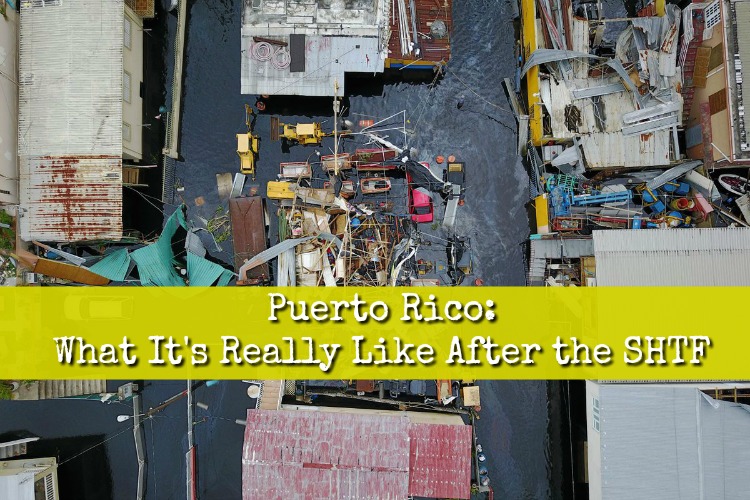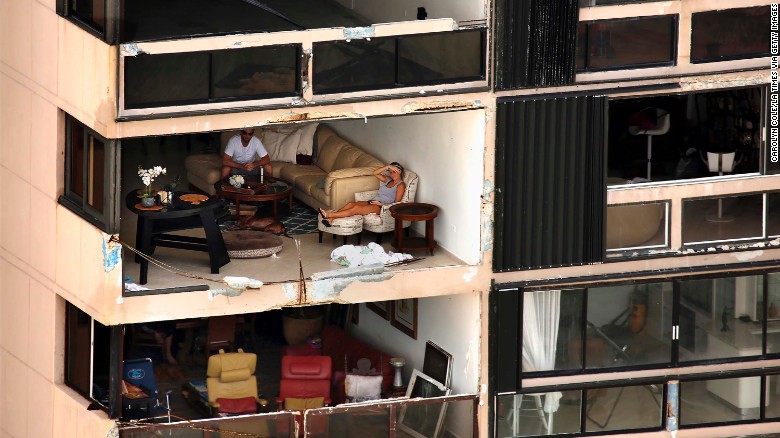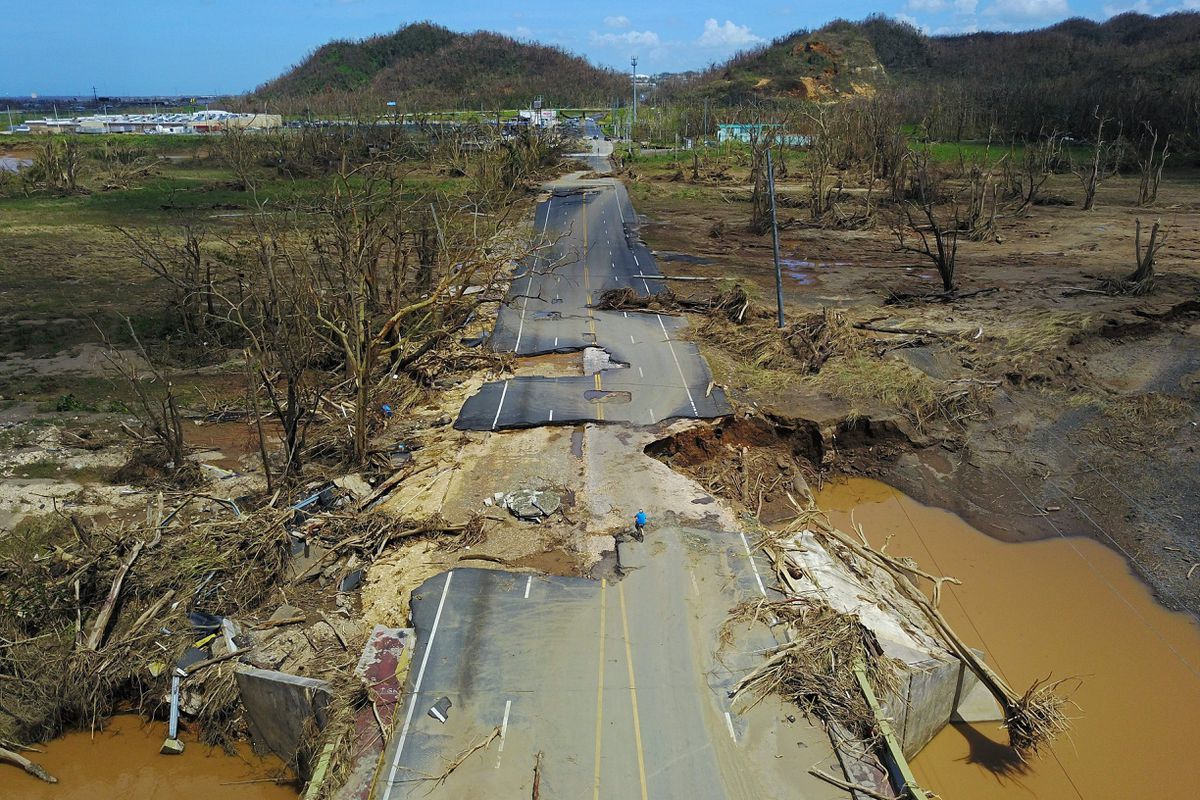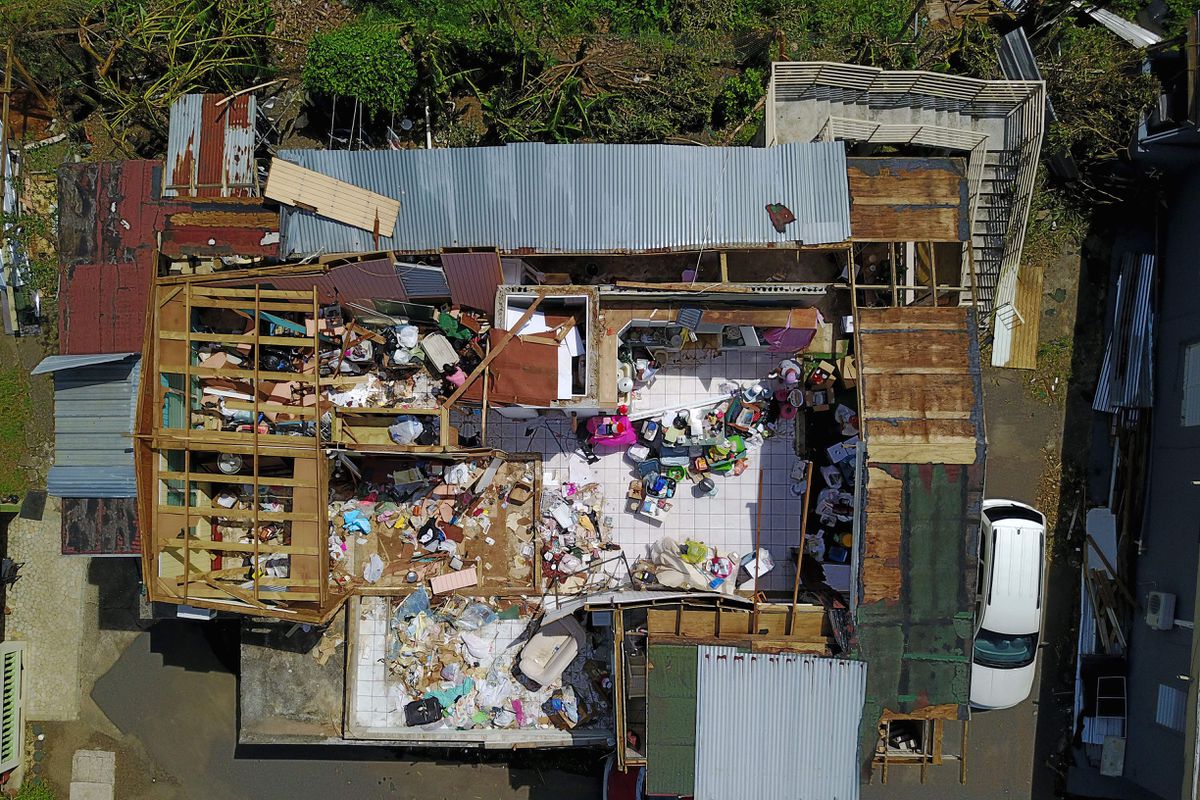If you're new here, you may want to subscribe to my RSS feed. Thanks for visiting!
By Daisy Luther
Things are dire in Puerto Rico. We haven’t heard much directly from people there since Hurricane Maria took out power for the entire island, but what we do know is that the situation is desperate. This is a shocking, real-life glimpse into what it’s really like when the S hits the fan.
I saw a post from a friend of a friend who has family in Puerto Rico. I don’t have permission to share names, but here’s what she said:
“My family has lost everything. My uncle with stage 4 cancer is in so much pain and stuck in the hospital. However conditions in the island are far worse than we imagined and my greatest fear has been made reality. The chaos has begun. The mosquitos have multiplied like the plague. Dead livestock are all over the island including in whatever fresh water supplies they have.My family has been robbed and have lost whatever little they had left. The gang members are robbing people at gun point and the island is in desperation. People are shooting each other at gas stations to get fuel.They’re telling us to rescue them and get them out of the island because they are scared for their lives. We’re talking about 3.5 million people on an island, with no food, no drinking water, no electricity, homes are gone. Family if you have the means to get your people out, do it. This is just the first week. Imagine the days and weeks to come. These are bad people doing bad things to our most vulnerable.Imagine a few weeks with no resources and the most vulnerable become desperate. What are you capable of doing if your children are sick and hungry? We have to help.”
I decided to vet what I could, and I believe this horrible story is absolutely true. I confirmed that there is very little food, no fresh water, 97% are still without power, limited cell signals have stymied communications, and hospitals are struggling to keep people alive. There is no 911. Help is not on the way. If you have no cash, you can’t buy anything. As people get more desperate, violence increases.
Never doubt that such an event could happen to any of us, no matter how carefully we prepare. Your best-laid plans could be swept away by a storm, flood, or fire. The immediate support most people have grown to expect might not be on the way.
Here’s what I learned.
Many homes were completely destroyed.
In the town of Catano, more than 60% of the residents are homeless due to the storm. At the shelter in Catano, the bathrooms flooded and sewage backed up into the building. There is food, but no water. It’s hot, dark, and the stench is overwhelming. There is more than one person at the shelter who is diabetic, and there is no ice for their insulin. (source)
Rivera Aviles, a Cataño city council member who set up the shelter with the help of her husband, found that her home was devastated, too.
She and her husband evacuated before the storm because their house — made of wood — is close to the water’s edge. After Maria passed she returned home and was shocked that “the entire roof was blown off.”
“Everything got wet — the beds, furniture, everything,” she says. The water damage has made it unlivable. (source)
The homes that are still standing were horribly damaged. “Even in homes that remain standing on the island, water damage and power outages have destroyed most belongings, medicine, and food.” (source)
photo credit
There is hardly any potable water.
Nearly half the people in Puerto Rico are without potable drinking water. The tap water that is restored has to be boiled and filtered, and others are finding water where they can. You can expect a health crisis soon due to waterborne illnesses. When I researched my book about water preparedness, I learned that waterborne illness is one of the deadliest threats post-disaster. Although FEMA has delivered 6.5 million liters of water, on an island with 3.4 million people, it isn’t enough.
Isabel Rullán is the co-founder and managing director of a non-profit group called ConPRmetidos. She is very concerned about the water situation. She said that even if people were able to acquire water “they may not have the power or means to boil or purify it.”
She added that the problem went beyond access to drinking water — it was becoming a real public health concern.
Compounding that issue was hospitals lacking diesel and being unable to take new patients, she said.
“There’s so much contamination right now, there’s so many areas that are flooded and have oil, garbage in the water, there’s debris everywhere,” she said by phone.
“We’re going to have a lot of people that are potentially and unfortunately going to get sick and may die,” she said. (source)
According to the Department of Defense, 56% of the island has potable water, but in one town, Arecibo, the only fresh water comes froma single fire hydrant. (source)
Hospitals are struggling to keep people alive.
And speaking of hospitals, 59 of the 69 on the island were, according to the Department of Defense, “operating on unknown status.”
Only 11 of 69 hospitals on Puerto Rico have power or are running on generators, FEMA reports. That means there’s limited access to X-ray machines and other diagnostic and life-saving equipment. Few operating rooms are open, which is scary, considering an influx of patients with storm-related injuries. (source)
A hospital in San Juan reported that two people in intensive care died when the diesel fueling the generator ran out. The children’s hospital has 12 little ones who depend on ventilators to survive, and once they ran out of fuel, they have gotten by on donations. FEMA has delivered diesel fuel to 19 hospitals.
But many darkened hospitals are unable to help patients who need it most.
Without sufficient power, X-ray machines, CT scans, and machines for cardiac catheterization do not function, and generators are not powerful enough to make them work. Only one in five operating rooms is functioning. Diesel is hard to find. And with a shortage of fresh water, another concern looms: a possible public health crisis because of unsanitary conditions…
The hospitals have been crippled by floods, damage and shortages of diesel. The governor said that 20 of the island’s hospitals are in working order. The rest are not operational, and health officials are now trying to determine whether it is because they lack generators, fuel or have suffered structural damage. All five of the hospitals in Arecibo, Puerto Rico’s largest city in terms of size, not population, are closed. (source)
One emergency room director said, ““This is like in war: You work with what you have.”
And it isn’t just the hospitals that are dealing with medical crises.
“We are finding dialysis patients that haven’t been able to contact their providers, so we are having to transport them in near-death conditions,” Mayor Carmen Yulin Cruz said, recalling a group’s visit to two San Juan-area nursing homes this week. “We are finding people whose oxygen tanks are running out, because … small generators now don’t have any diesel.” (source)
Residents of Puerto Rico are also having trouble getting necessary medications.
A shortage of open pharmacies is another stressor, especially for the chronically ill and elderly residents. Most pharmacies in Puerto Rico remain closed, although they are slowly beginning to reopen. A CVS spokesman said that 21 out of 25 Puerto Rico-based CVS stores are now open, including 17 pharmacies. The first one reopened last Thursday. A Walgreensspokesman said about half of the island’s 120 stores are open and running on generators, but that hours vary. The stores are also receiving supplies of medication.
But many pharmacies in Puerto Rico are independently owned. With so many people pleading for medication, some pharmacists who know their clients are dispensing drugs without the required prescriptions or refill bottles.
Hospitals still have adequate supplies, and so do many of the open pharmacies, but there are concerns they may run out because suppliers are unable to get to them, said Dr. Victor M. Ramos Otero, the president of the College of Doctors and Surgeons of Puerto Rico.
Even when people find the drugs, they often cannot pay for them. Without electricity, A.T.M.s do not work and stores cannot accept credit cards or process insurance plans. (source)
The people who were already weakened by illness will fare the worst, shortly followed by those who become injured or ill in the aftermath.
There isn’t much food.
Much of the food on the island has spoiled or been contaminated.
In the town of Utuado, Lydia Rivera has started to ration crackers and drink rainwater to keep her two grandchildren alive. “No water, no food,” Rivera told CNN. (source)
José A. Rivera, a farmer on the southeast coast of Puerto Rico, stood in the middle of his flattened plantain farm on Sunday and tried to tally how much Hurricane Maria had cost him.
“How do you calculate everything?” Mr. Rivera said.
For as far as he could see, every one of his 14,000 trees was down. Same for the yam and sweet pepper crops. His neighbor, Luis A. Pinto Cruz, known to everyone here as “Piña,” figures he is out about $300,000 worth of crops. The foreman down the street, Félix Ortiz Delgado, spent the afternoon scrounging up the scraps that were left of the farm he manages. He found about a dozen dried ears of corn that he could feed the chickens. The wind had claimed the rest.
“There will be no food in Puerto Rico,” Mr. Rivera predicted. “There is no more agriculture in Puerto Rico. And there won’t be any for a year or longer.” (source)
There is little communication.
The lack of communications means that more remote areas have no idea what rescue operations are on the way, nor can they contact loved ones. And the lack of communication is vast:
1,360 out of 1,600 cellphone towers on the island are out. Many communities have been isolated from the outside world for days, relying only on radios for news. The communications shortage means the full extent of the crisis has not been assessed. (source)
photo credit
Surprisingly, one of the most reliable ways to contact the outside world is with Facebook Messenger.
In fact, Facebook has dispatched a “connectivity team” to help more people contact loved ones. AT&T is bringing giant floating antennas in an effort to restore cell service.
It won’t be any surprise to preppers that ham radio operators are the only people still reliably able to communicate.
When things went dark and quiet in Puerto Rico, a cadre of amateur radio operators became a lifeline on the island.
About two dozen amateur radio operators on the island helped police and first responders communicate when their radio networks failed completely. Some of the radio operators, or hams traveled on trucks to provide communications to the power company, PREPA…
Now the ranks of operator are about to get reinforcements.
At the request of the Red Cross, the league planned to send 50 radio operators into Puerto Rico with “enormous” radio gear in water proof containers, their own power supplies, new generators and solar arrays. The crew and equipment were to leave Thursday from Atlanta.
Their job, once set up and in place, will be to be the communication pipeline for the Red Cross Safe and Well program, helping people on the mainland trying to connect with loved ones on the island or get news of their status. (source)
CNN offered the following links for those trying to check on loved ones.
- Contact the Puerto Rico Federal Affairs Administration.
- Here’s a link to a directory of the Puerto Rico emergency operations center.
- Puerto Rico Maria Updates is a public Facebook group, collecting information for those affected by Hurricane Maria. People are posting messages asking for information about specific towns and specific people. Facebook has also turned on its safety check feature.
- You can also try to find family and friends via the American Red Cross. Use the safe and well page.
As the desperation increases so does the danger.
People are waiting four hours or longer for a gallon of gasoline and fights are breaking out in the lines as tensions run high.
A curfew is in effect to try to squelch looting but success has been limited.
Incidents … are common in the capital, where men carrying bats and clubs have been seen on the streets during curfew hours. The mayor of San Juan, Carmen Yulin Cruz, told WAPA Radio, “We highly advise everyone not to be on the streets at night. It is not safe,” warning that reports of looting are on the rise.
“That is definitely something I don’t want to hear. Especially when the only lighting I have during the night is candlelight,” said Bianca Nevarez, who lives in Bayamon, where the scenario is much more tense since 13 prisoners escaped while they were being transferred to another criminal facility after the Category 5 storm caused severe damage in the prison. “We have captured eight of them, so five are still on the loose,” Ramon Rosario, secretary of Public Affairs of La Fortaleza told The Daily Beast.
Rosario added that 21 arrests have been made across the metropolitan area as a result of those breaking the curfew, which now runs from 7 p.m. to 5 a.m. No expiration date has been set.
“We will leave it active until the emergency period that we are suffering settles,” said Governor Ricardo Rosselló, noting that anyone caught on the streets during curfew hours will face up to six months in prison. (source)
Others talk about brazen crimes.
“We heard about an apartment building where four people broke in,” Rullan said. “People are worried … and just trying to be really cautious. Someone told me today that a person went into a gas station with rifles and told everyone, ‘It’s our turn to fill our tanks.’” (source)
OpsLens reports that the military is now joining forces with local police to curb the lawlessness.
Despite the significant threat to life, those who prey on others during strife and otherwise weak states are lurking. As has been reported here on OpsLens, public safety assets from the US mainland and elsewhere are striving to get boots-on-the-ground reserves in place to join the Puerto Rico factions of police trying to quell these sinister sorts from exacerbating inexplicable circumstances. (source)
Expect this to get even worse as the desperation increases.
Why has help been so slow to arrive?
Why is it that hardly any aid has arrived for this US territory? Geography and infrastructure damage are definite factors, and red tape and ridiculous laws are making matters even worse.
Difficulty lies in the fact that harbors and airports were severely damaged by Hurricane Maria. Roads are blocked with debris and some areas are still flooded. Lack of communication also plays a part. Relief supplies are stranded in port because there isn’t a way to distribute them. (source) A shortage of drivers and diesel fuel meanw that some of the aid that HAS arrived can’t be distributed.
photo credit
As always, bureaucracy is slowing things down. San Juan’s mayor said:
“We need to get our s— together because people are dying,” San Juan Mayor Carmen Yulín Cruz said on CBSN. “People are really dying.”
“It’s life or death,” Cruz said. “Every moment we spend planning in a meeting or every moment we spend just not getting the help we’re supposed to get, people are starting to die. This is not painting a picture. This is just the reality that we live in, the crude aftermath of a storm, a hurricane, that has left us technically paralyzed.” (source)
This is a perfect example of the United States having far too many laws. One, in particular, has slowed relief. The Jones Act is a law from the 1920s that makes it illegal to ship foreign goods on American ships with an American crew.
The Jones Act, otherwise known as the Merchant Marine Act of 1920, requires goods shipped between American ports to be carried out exclusively by ships built primarily in the United States, and to have U.S. citizens as its owners and crews.
Signed into law by President Woodrow Wilson two years after World War I ended, the Jones Act was passed as a protective measure against foreign competition, particularly Germany. By restricting domestic trade to U.S.-flagged vessels with U.S. crews, America would always have a robust fleet of boats and sailors on hand in the event German submarines attacked the U.S. (source)
President Trump immediately suspended the Jones Act to allow fuel to get through after Texas and Florida were hit by back to back hurricanes but last night, an entire week after Puerto Rico was cut off from the world, he was still “thinking” about it.
“We’re thinking about that, but we have a lot of shippers and a lot of people, a lot of people who work in the shipping industry, that don’t want the Jones Act lifted.” (source)
Mercifully, this morning, Trump finally made his decision and lifted the Jones Act. (source)
To be fair, some aid has gotten through and FEMA says they have 10,000 people on the ground in Puerto Rico to help out with search, rescue, and recovery. President Trump also waived the legal requirement for a state to pay for one-fourth of the cost of the disaster since Puerto Rico is bankrupt. The military is airdropping food and supplies to more remote areas of Puerto Rico that are unable to be accessed by roads.
Help is also coming from private sources. Musician Pitbull is using his private plane to fly cancer patients to the US for treatment, and Mark Cuban, the owner of the Dallas Mavericks is sending a planeload of supplies. (source)
Lessons from Puerto Rico
It would be delusional to think that this kind of disaster could never happen to us. Of course, the size of our mainland means that disasters tend to be regional and that it is fairly easy logistically to get aid to different areas, but don’t be lulled into a false sense of security. There are some kinds of disasters that could affect the entire nation, like an EMP, just to name one chilling example.
These lessons could save your life in such a situation:
- Storing non-perishable food and off-grid supplies is very important.
- Have the supplies on hand to purify water.
- Have the necessary skills to access food and water if your supplies are destroyed.
- When all communications are down, ham radio will still work if you can get the power to run it.
- Keep extra essential medications on hand.
- Be prepared for the day when there is no medical help available.
- Keep up to date on current events so that you can be better prepared for what is headed your way.
- Always have cash in small denominations.
- Do not depend on a generator for a long-term emergency. Prep low-tech because fuel will be short and it will help you to stay under the radar.
- Be prepared to defend your home and family as desperation increases.
Having a plan is essential but it isn’t foolproof. No area is completely immune to disasters…earthquakes, wildfires, tornadoes, floods…these can happen just about anywhere. It’s easy to say, “Oh, it’s their own fault for living on an island/not prepping/not evacuating” but this attitude belies the fact that a disaster could wipe out any of us at any time. Maybe it’s callousness, or maybe it’s really just denial.
The terrible situation in Puerto Rico is proving true many theories about the aftermath of an all-out SHTF disaster. Particularly, it has proven that help is not always on the way, you have to know how to survive when absolutely everything is gone, and that desperate people do desperate things.
These are lessons we should all take to heart.



/cdn.vox-cdn.com/uploads/chorus_asset/file/9336857/puerto_rico_cell_tower.jpg)

















“This is just the first week. Imagine the days and weeks to come.”
How quickly things can break down.
I have read that less than 100 years ago, Puerto Rico grew over 90% of their food. As of 2016, they grew only a small percent of their food.
A sobering thought…
Think it would be any different in most cities?
The one thing that lots of us want to stockpile and cannot is prescription medicines. Note how some pharmacists are giving people their meds without all the red tape. God Bless ’em. I don’t know why we can’t get prescriptions way ahead of time – must be laws protecting us from ourselves. I would like to see the rules change allowing us to get a year or more of meds at one time
Janie, You Can!
Insurance… will let you fill you prescription at about 28 days, be faithful and refill every 28 days and you will get 2-3 days a months extra. Hit you doctor up for an extra prescription a year for fill in the blank such as Fema says have extra on hand for emergency or extra because you will be on vacation (you may have to pay cash for this). It adds up quick, rotate to have the fresh supply in stash 🙂
as long as they are not pain meds its relatively easy to order meds from over seas. fairly cheap as well. look into the legality of any you order.
What a sad situation… When we talk about water filtration for events like this we need to
consider the type of water we’re dealing with. In these last hurricane scenarios, there’s so many different contaminants in the water supply in general, it near impossible to get potable drinking
water. Consider units that can filter out salt if you’re near oceans.
I would like so much to find these global elites who are on a drive of depopulation and help them to disappear never to be seen again. These Hurricanes were man made —–had nothing to do with nature. All them acted freaky and not in the normal way. I ‘ve been in them –trust me and the ones who know weather are speaking out. These elites wanted damage in the worst way. Irma was huge—-OVERLY HUGE — there as never been one that huge. and stay stationary like that —no — they wanted damage and people dead.!! So it is up to all of us to be double ready for anything they have planned. Extra everything you might need.!!!!
so you can use the fresnel lens off of the front screen of a projection TV to focus the suns ray , kinda like a big magnifying glass to BOIL water or cook
with out electricity or fuel ….
in the daytime
use welding goggles and gloves and be cautious working with the focused light as it gets very bright and very HOT
. i suspect there may be a few wrecked projection TVs in the damaged furniture pile s .
and
i would like to know if the GPS system is functional now ? in the areas with little to no cel phone service ?
I too lived through Irma suffering a direct hit at landfall here in Florida. It was devastating here also. We lived in utter isolation for 18 days before power was restored. Our telephones have yet to recover. Did we have any outside help? None at all; but we ere prepared.
Daisy, I’d like to write you an article about my experience, please let me know.
Mike
Wow, a very enlightening article. Daisy’s “Lessons from Puerto Rico” are great but I would like to add some thoughts. Put EVERYTHING in water tight containers! You can buy plastic totes up to several cubic feet, but the tops for the larger ones just snap on and are NOT water tight. I suppose you could seal it with duct tape but I have to wonder if duct tape would keep water out of a container when submerged for a week! Probably not! Suggestions anybody? I have a big water filter unit and extra filters, but since water is the number one item for survival I think I will buy 2 or 3 more units. I will store them in separate places and in WATER TIGHT CONTAINERS. My spare ham radios are in EMP packaging, but I am going to put them in WATER PROOF CONTAINERS. I have a 100 watt foldable solar panel with charge controller, a sine wave inverter, 110 volt charger and cables and books to hook it all up. Plus a distribution panel from West Mountain Radio and USB charger gadgets that will run off 12 volts. Plus lots of rechargeable AA, AAA, and D batteries and 3 chargers. Reading this article I see that I need more than one of everything, especially 12 volt batteries and solar panels. And I need to store it all in EMP AND WATER PROOF CONTAINERS. For boiling water and cooking without power I have bought a cast iron grill and large cast iron dutch oven pots. I can cut wood or use wood disaster scraps to burn in the stove. I’m going today to buy WATER PROOF CONTAINERS for my medicines! I would love to know if meds and other supplies are available there with 90% silver coins or small gold coins!
Good job Daisy. Many thanks to you and many prayers for PR.
Donald Trump’s white supremacist views are well-known and well-exercised. He’d happily put a military cordon around Puerto Rico, airlift any white people who are there, and let the rest of ’em die if he could get away with it.
Alex in San jose, You are a total idiot!
Stop buying all that media propaganda. Donald Trump has no history of white supremacy. If you look at his very public life, he has always been just the opposite and a very generous and open minded person with no prejudices. Just because his opponents claim he’s racist doesn’t make it true. These people have an agenda. They want to win the loyalty of minorities by demonizing their politcal opponents. Funny how Donald Trump and half of the U.S. citizens became white supremacist overnight just by winning an election. Use your brain. You really think that is what happened? C’mon.
The brother of a close friend has a very successful electircal business in Puerto Rico laying, cable wires. He is married to a Puerto Rican. He told me that Puerto Ricans will steal anything not tied down, crrime is rampant and that was long before the storm. He& his family have survived via generators. He wanted to retire but kept his buisness going because his employees will lose their jobs.Puerto Rico is bankrupted. He reports via email that his buisness has exploded after the storm and many have lost their homes. Remember the majority of homes inPR were NOT built to code. We also have a young couple that are good friends living in PR. I practically begged them to leave PR days before the storm and come stay with us. They wanted to experience the storm and thought it would be OK. (young, foolish & think they know everything) We have not heard from them since the storm hit.
Yep, all the leeches, gravy train riders, blue-pillers, sheeple, low IQ, uninformed TV watchers are all fat, dumb & happy as long as the electricity is on & the food is being delivered, but when the music stops… after about 3 days of no food or water they’ll get violent.
Be prepared to protect yourself and don’t turn your back on a stranger.
The worst part is that because the electrical grid in Puerto Rico is so outdated and there are so few qualified for fixing the grid, power is not likely to be restored for months. Even in the cities.
Hello, I enjoy your site. Why not write an article about earthquake proofing your supplies (or protecting them from flooding or wildfire)? If all your jars of preserves get smashed or the boxes of food are submerged in polluted water then what was the point of buying and storing it all? There must be easy ways of adding safety bars to a set of shelves or using waterproof (not water resistant) storage containers to ensure the survival of your supplies.
Also, if an earthquake should crack your well casing or snap your water pipes from the cistern what methods or products can be used to clean the water and manually pump it?
Funny your great article came to me while I’m watching D-day (TV series 2015) on Netflix. It’s set in Seoul, Korea, and the conditions after an earthquake in the series are quite similar to those in Puerto Rico, but mainly from the medical point of view. This show is among the top SHTF shows I have seen.
Thank you, Daisy for the excellent article. I cried all the way through, and now to find a legit organization to donate to to help these in need, in my small way.